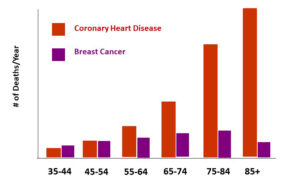What Does This Study Mean For You?
Author: Dr. Stephen Chaney

Should you avoid calcium supplements because they increase your risk of heart disease? Some headlines and blog posts would have you believe that. You may have been told that by your doctor. But is it true?
Unfortunately, this is another example of the swinging pendulum that we often see in supplement studies. One day a study comes out saying that calcium supplements increase the risk of heart disease. A few months later another study comes out saying that is not true. Calcium supplements don’t increase heart disease risk.
The pendulum keeps swinging until you are totally confused. You don’t know what to believe. And “experts” (including your doctor) pick one side or the other depending on what they believe about supplements in general.
I have told you before that good scientists wait until multiple studies have been done and base their opinion based on what the preponderance of studies show. I can tell you that multiple studies have been done and the preponderance of studies show that calcium supplements do not increase the risk of heart disease. But that doesn’t prove that calcium supplements are safe. It just shows they are likely to be safe.
That is why the authors of the current study (X Huo et al, Current Developments In Nutrition, volume 7, Issue 3: 100046, March 2023) analyzed the weaknesses of previous studies and tried to design a study that lacked those weaknesses.
How Was This Study Done?
 The investigators searched through the literature to identify all placebo-controlled, randomized clinical trials (the gold standard for clinical studies) assessing the effects of calcium supplements alone or calcium supplements with vitamin D on heart disease, stroke, and all-cause mortality.
The investigators searched through the literature to identify all placebo-controlled, randomized clinical trials (the gold standard for clinical studies) assessing the effects of calcium supplements alone or calcium supplements with vitamin D on heart disease, stroke, and all-cause mortality.
They restricted their analysis to studies with at least 500 participants that lasted for at least a year. They further restricted their analysis to studies whose authors were willing to share unpublished data on the number of participants in each treatment group who had a heart attack, stroke, or any other kind of heart disease; died from heart disease; or died from all causes during the study.
They ended up with 11 clinical studies in their analysis. The breakdown was as follows:
- Seven studies with 8,634 participants compared calcium alone with placebo.
-
- Participants in these studies averaged 71 years old and were 79% female.
-
- The daily calcium dose varied from 1.0 to 1.5 g/day.
-
- The mean duration of treatment was 4.1 years (range = 2-5 years).
- Six studies with 46,804 participants compared calcium plus vitamin D with placebo.
-
- Participants in these studies averaged 65 years old and were 98% female.
-
- The daily calcium dose varied from 1.0 to 1.5 g/day and the daily vitamin D dose ranged from 400 to 2,000 IU/d.
-
- The mean duration of treatment was 6 years (range = 1.5-7 years).
- In case you were wondering about the math, some studies included both calcium alone versus placebo and calcium plus vitamin D versus placebo.
The authors then combined the data from all 11 studies and performed a meta-analysis on the effect of calcium alone on adverse heart outcomes and calcium plus vitamin D on adverse heart outcomes.
Are Calcium Supplements Safe?
- Calcium alone was not significantly associated with any increased risk of heart attack, stroke, heart disease of any kind, deaths from heart disease, and deaths from all causes.
- Calcium with vitamin D was not significantly associated with any excess risk of heart attack, stroke, heart disease, deaths from heart disease, and deaths from all causes.
In their discussion, the authors pointed out two caveats to their conclusions:
- In the calcium only portion of the meta-analysis the number of participants who experienced a stroke or types of heart disease other than heart attack and stroke was very small. So, they could not exclude an absolute increased risk of 0.3-0.5% per year for these types of rare events.
- The participants in the 11 studies included in their meta-analysis were not selected based on their risk of heart disease. So, the authors could not exclude the possibility that calcium supplements might increase the risk of heart disease in people who were already at high risk of heart disease.
The authors concluded, “This meta-analysis demonstrated that calcium supplements were not associated with any significant hazard for heart disease, stroke, or all-cause mortality…Hence, for people with low bone density and low absolute risks of heart disease, the present report demonstrates no concern about excess heart disease risks associated with calcium supplements.
However, further large trials are needed to assess the efficacy and safety of combined supplementation with calcium and vitamin D for the prevention of osteoporotic fracture in older people at high risk of heart disease.”
What Does This Study Mean For You?
 As I said above, the preponderance of evidence suggests that calcium supplementation does not increase your risk of heart disease. This study reinforces that conclusion.
As I said above, the preponderance of evidence suggests that calcium supplementation does not increase your risk of heart disease. This study reinforces that conclusion.
I can’t guarantee that some future study won’t come to the opposite conclusion, and the pendulum will swing again. And I can’t guarantee that your doctor has kept up with the most recent literature on calcium supplementation and heart disease risk.
The authors of this study also pointed out that we don’t have any clinical studies on the effect of calcium on heart disease risk if you are already at high risk of heart disease. So, if you are at high risk of heart disease, any advice that I or your doctor give you about calcium supplementation might be wrong. We simply don’t know.
Finally, I realize that you may be equally confused about whether calcium supplementation can strengthen your bones and reduce your risk of osteoporosis. I won’t discuss that question today. Instead, I will refer you to two previous articles I have written in “Health Tips From the Professor” on that topic.
The first article discusses the flaws in previous studies claiming that calcium supplements are ineffective at increasing bone density and preventing osteoporotic fracture.
The second article describes a bone-healthy lifestyle.
The Bottom Line
While the preponderance of studies have shown that calcium supplementation does not increase the risk of heart disease, that conclusion remains controversial.
To clarify that issue, a group of investigators searched through the literature to identify all placebo-controlled, randomized clinical trials (the gold standard for clinical studies) assessing the effects of calcium supplements alone or calcium supplements with vitamin D on heart disease, stroke, and all-cause mortality. They then performed a meta-analysis of those clinical studies.
Their meta-analysis showed that:
- Calcium alone was not significantly associated with any increased risk of heart attack, stroke, heart disease of any kind, deaths from heart disease, and deaths from all causes.
- Calcium with vitamin D was not significantly associated with any excess risk of heart attack, stroke, heart disease, deaths from heart disease, and deaths from all causes.
This study strengthens the conclusion that calcium supplementation does not increase the risk of heart disease.
For more details about the study and references discussing the effect of calcium supplementation on bone density, read the article above.
These statements have not been evaluated by the Food and Drug Administration. This information is not intended to diagnose, treat, cure, or prevent any disease.
______________________________________________________________________________
My posts and “Health Tips From the Professor” articles carefully avoid claims about any brand of supplement or manufacturer of supplements. However, I am often asked by representatives of supplement companies if they can share them with their customers.
My answer is, “Yes, as long as you share only the article without any additions or alterations. In particular, you should avoid adding any mention of your company or your company’s products. If you were to do that, you could be making what the FTC and FDA consider a “misleading health claim” that could result in legal action against you and the company you represent.
For more detail about FTC regulations for health claims, see this link.
https://www.ftc.gov/business-guidance/resources/health-products-compliance-guidance
_______________________________________________________________________
About The Author
 Dr. Chaney has a BS in Chemistry from Duke University and a PhD in Biochemistry from UCLA. He is Professor Emeritus from the University of North Carolina where he taught biochemistry and nutrition to medical and dental students for 40 years. Dr. Chaney won numerous teaching awards at UNC, including the Academy of Educators “Excellence in Teaching Lifetime Achievement Award”. Dr Chaney also ran an active cancer research program at UNC and published over 100 scientific articles and reviews in peer-reviewed scientific journals. In addition, he authored two chapters on nutrition in one of the leading biochemistry text books for medical students.
Dr. Chaney has a BS in Chemistry from Duke University and a PhD in Biochemistry from UCLA. He is Professor Emeritus from the University of North Carolina where he taught biochemistry and nutrition to medical and dental students for 40 years. Dr. Chaney won numerous teaching awards at UNC, including the Academy of Educators “Excellence in Teaching Lifetime Achievement Award”. Dr Chaney also ran an active cancer research program at UNC and published over 100 scientific articles and reviews in peer-reviewed scientific journals. In addition, he authored two chapters on nutrition in one of the leading biochemistry text books for medical students.
Since retiring from the University of North Carolina, he has been writing a weekly health blog called “Health Tips From the Professor”. He has also written two best-selling books, “Slaying the Food Myths” and “Slaying the Supplement Myths”. And most recently he has created an online lifestyle change course, “Create Your Personal Health Zone”. For more information visit https://chaneyhealth.com.
For the past 45 years Dr. Chaney and his wife Suzanne have been helping people improve their health holistically through a combination of good diet, exercise, weight control and appropriate supplementation.
















